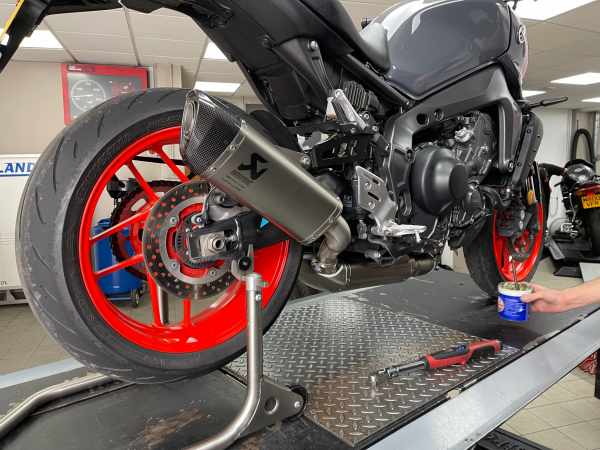
Yamaha has kindly opened up pandora’s box, and our long term MT-09 has been graced with a lovely Akrapovič full system exhaust
AS aftermarket exhaust systems and end cans are one of the most popular modifications on two wheels, we thought that the optional Akrapovič full system exhaust was the perfect first mod’ we made to our long-term Yamaha MT-09.
Sadly for me, as I really don’t mind an afternoon in the shed, Yamaha asked if we could take the MT-09 along to Alf England Motorcycles in Bedworth for the fitment of the system – probably to ensure no corners were cut! That isn’t to say that you couldn’t fit the system at home though. The kit is plug and play, and the most specialist tool you’ll need is a spring puller. Having some paddock stands to carry out the job is a must, and a ramp or bike lift a bonus. For me though, the time it took a trained and experienced technician was well worth organising, especially knowing that in doing so the job had been done correctly.
What’s in the box?
In the box, you will have four main parts to the exhaust, the manifold, under-belly silencer, the end can, and catalytic converter. You’ll also have an exhaust hanger, bag of fixings, springs and thread-lock, and some instruction manuals in different European languages.
Where to start?
Before diving into the job, myself and Alf England mechanic Ash lay out the pieces of the system on the workbench and check all is where it should be. Checklist ticked, the first task is to give the manifold nuts a squirt of WD40 to help with the OE system’s removal.
Removing the stock exhaust
Now, this bike isn’t very old and has just over 1,000-miles on its bores. But that doesn’t mean those manifold nuts would have played ball. Better to give them a squirt, and let that take effect than risk rounding one of them off.
While the WD40 does its thing, Ash removes the radiator bracket that fixes the bottom of the radiator to the engine block. It’s a fiddly job, and important to let the bike cool down sufficiently as your hands will be right by the exhaust manifold.
Once the manifold flanges are loose there are just two more bolts on the underside – one on either side of the bike – and with a bit of wobbling the whole thing should come free.
All about the build quality!
Now the stock exhaust is off the bike it becomes immediately clear where your £1,500 has gone. The exhaust on the bike as standard is, like any other, built with certain compromises in place. Cost, weight, homologation rules and ease of installation on the production line being just a few. Holding the single-piece stock system next to the Akrapovič item is like trying to compare a Big Mac with a fillet steak. For starters, the new exhaust is titanium in parts, meaning it just looks sexier. But the more you look, the better it gets.
The collector box on the Akrapovič is a work of art, with the three downpipes changing shape to maintain the same volume before they merge into one large downpipe. The joins are perfect and the under-slung silencer despite being mostly hidden away is a lovely thing to behold.
Fitting the full system Akrapovič to the 2021 Yamaha MT-09
The first task in fitting the new exhaust weirdly starts at the other end of the bike! The instructions ask that we remove the pillion peg on the right side of the bike and fit the exhaust hanger. The bolts here are different lengths, so it’s important you are methodical and follow the instructions.
A dab of thread-lock is advised, and once the bolts are hand tight, torque them up to 22Nm (16ft-lb). Oddly, the instructions also recommend changing the bolts on the other footpeg too. We couldn’t really figure this out, although the bolts in the kit don’t totally match the OE items, so it must be so each side matches.
Once that is done, you’ll have the fairly fiddly job of reattaching the manifold flanges and the really fiddly job of bolting the radiator mounting back onto the engine. Once they are on, leave the manifold loose as you’ll benefit from a bit of play in the system when you come to link the pieces together.
Next up you’ll need to mate the manifold to the underslung silencer of the bike. It’s handy to have some mechanical assistance here, in the form of a trolley jack or another pair of hands to take the weight of the silencer. Once it is in place there are just the two bolts on either side – don’t tighten them up though. You’ll be thread-locking and torquing those once the end can is in place.
Fitting the end can is as simple as it gets – slip the clamp over the pipe, a slither of copper slip on the tip and you’re good to go. Pop a bolt through the hanger and tighten the nut using your fingers.
Once you have done that you have one final job before going back and torquing all the nuts up to spec, fitting the lambda sensor. When you do this it’s vital not to overtighten it, and make sure that the wire leading to the sensor doesn’t foul against the hot exhaust or it’ll end up getting knackered and causing a breakdown.
To catalyst or not to catalyst?
One of the benefits of the Akrapovič system is that the catalytic converter is not fixed in the exhaust, meaning should you wish to leave it out of the exhaust altogether, you can. Leaving it out will save weight, the cat’ alone weighs about 1.5kg, but more importantly removes some restriction within the exhaust. You won’t technically be breaking any laws, emissions aren’t tested on a motorcycle MOT (yet), and as this bike has already effectively been sold, we are allowed to modify the exhaust in this manner.
What are the gains for choosing the Akrapovič system?
Just looking at the quality of the Akrapovič you can already tell it is going to be a more free breathing system than stock. The welds are works of art, and the edges that sit within the gas flow are all much smoother and more polished than the stock system.
Weight-wise, there isn’t much to call between the two as the aftermarket system only comes in a couple of hundred grams less than the stock one. Take the catalyst out of that equation and you’re saving around 1.5 to 2.0kg by adding the exhaust.
To find out what difference there was in terms of sound, I downloaded a decibel metering app for my phone and calibrated it to a professional noise meter at my local music shop. Now, I know this isn’t going to be spot on in terms of accuracy, but as both my before and after readings were going to be done on the same app, it’s a good enough guide for the purposes of the review.
Interestingly, the titanium system is actually only marginally louder than stock, with the Akrapovič reading 79dB at 5,000rpm and the stock system measuring 78dB at the same revs. That’s not to say that the bike still sounded the same though.
Stock exhaust
The stock exhaust on the new 2021 Yamaha MT-09 has a slightly muted tone to it, with very little rasp to speak of. The new system has a much more gravelly tone, not necessarily at tick-over, but higher up the rev range around 6,000rpm. The new system also accentuates the pops and bangs you get from the quickshifter on up and downshifts – always a good feature in my mind!
Akrapovič full system
It’s worth noting that my bike hasn’t totally got to grips with the new, more free-flowing exhaust as yet. It’s running rich as it is and seems like the ECU is still taking a bit of time to learn the new system. That said, it is designed for this bike, and Yamaha has confirmed that it will come into its own after a few more miles.
I was always going to anyway, but I’ll be getting the bike looked at by a Dyno centre in the coming weeks, just to see what the output is now and also to see if the fuelling can be improved in any way. While it’s not necessary to have this done for this exhaust change, even the staff at Alf England recommend getting a remap done when adding a full system exhaust.
Yamaha MT-09 Akrapovič exhaust first impressions
After fitting the system, I headed off for a couple of hours on the bike, first and foremost to see what I thought of it, but also to give the ECU a chance to recalibrate itself. My first impressions are that the new exhaust has a noticeably more aggressive exhaust note. It’s raspier, sounds punchier, and with much more pronounced plosives when shifting using the quickshifter. There is also a nice burble on the overrun when coasting up to a stop which is a nice touch.
In terms of performance, I can’t be sure how much has been added or in what part of the rev-range, but the bike seems to pull much harder than before. The stock MT-09 is a quick bike, but adding the full-system exhaust seems to have had a noticeable improvement in delivery and output.
To find out for sure I’m going to be getting the MT-09 down to my local Dyno tuning centre, although not before I ditch the bike’s paper air filter and swap it out for a more free-flowing item.
For more information on this system, head to: www.yamaha-motor.eu

